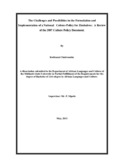Please use this identifier to cite or link to this item:
https://cris.library.msu.ac.zw//handle/11408/78Full metadata record
| DC Field | Value | Language |
|---|---|---|
| dc.contributor.author | Chakwamba, Kudzanai | - |
| dc.date.accessioned | 2014-08-26T16:09:18Z | - |
| dc.date.available | 2014-08-26T16:09:18Z | - |
| dc.date.issued | 2013 | - |
| dc.identifier.uri | http://hdl.handle.net/11408/78 | - |
| dc.description.abstract | The study is given impetus by the idea that there are conflicting statements surrounding the formulation and implementation of the 2007 National Culture Policy of Zimbabwe. The study reviews the 2007 National Culture Policy of Zimbabwe document, inorder to expose the challenges in the formulation and implementation of the policy so as to map the way forward. The study is guided by the by Neo Marxist Critique theory of hegemony and ideology. The theories are important in this study because there give emphasis on how the ruling ideas in every epoch are the dominant ideas. The theory of hegemony and ideology gives an insight on who informs policy making, how it supposed to legitimised, who influences over the content, formulation and implementation of the National Culture Policy of Zimbabwe. This study employs different data gathering tools which are interviews, questionnaires and desk review to gather data needed for compilation of this study. Information gathered using above mentioned data collection tools was analysed and presented in descriptive form. The researcher used qualitative research design and it was complimented by quantitative research design in presenting the findings in pie-charts and graphs. Research findings show that challenges in the formulation and implementation of the National Culture Policy of Zimbabwe is being necessitated by the state dominance and control of the culture production. The study also observes that 2007 National Culture Policy of Zimbabwe, it was just declaration without implementation because it was not inclusive and was meant to serve the political, economic and social agenda of the ruling state. Therefore, the research concludes that culture policy making in Zimbabwe it is a highly contested issue which is actually dominated ideas of dominant class. Therefore research findings shows that policy making process in Zimbabwe it is political not a democratic issue. Policy making in Zimbabwe it is an elitist product which is characterised by centralisation of policy decision making. The study comes to conclusion that policy makers, artist cultural practitioners, government ministries, departments and parastatals needs to come up with more possible solutions to enhance chances of coming up with sound and implementable National Culture Policy of Zimbabwe. This shows that a National Culture Policy document is important for Zimbabwe because it provides a framework that fosters the development and sustainability of culture in nation building. | en_US |
| dc.language.iso | en | en_US |
| dc.publisher | Midlands State University | en_US |
| dc.subject | Culture policy | en_US |
| dc.title | The challenges and possibilities in the formulation and implementation of a national culture policy for Zimbabwe: a review of the 2007 culture policy document. | en_US |
| item.languageiso639-1 | en | - |
| item.grantfulltext | open | - |
| item.fulltext | With Fulltext | - |
| Appears in Collections: | Ba African Languages And Culture Honours Degree | |
Files in This Item:
| File | Description | Size | Format | |
|---|---|---|---|---|
| chakwamba final dessertation 2013 MAY 24.pdf | 847.65 kB | Adobe PDF |  View/Open |
Page view(s)
280
checked on Jan 11, 2026
Download(s)
382
checked on Jan 11, 2026
Google ScholarTM
Check
Items in MSUIR are protected by copyright, with all rights reserved, unless otherwise indicated.



